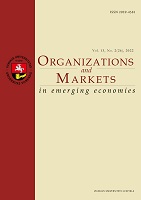Investigation of Fractal Market Hypothesis in Emerging Markets: Evidence from the MINT Stock Markets
Investigation of Fractal Market Hypothesis in Emerging Markets: Evidence from the MINT Stock Markets
Author(s): Yunus KaraömerSubject(s): Economic history, Present Times (2010 - today), Financial Markets
Published by: Vilniaus Universiteto Leidykla
Keywords: long memory; fractal market hypothesis; emerging markets;
Summary/Abstract: This study aims to investigate the market efficiency of emerging stock markets, namely the Mexico, Indonesia, Nigeria, and Turkey (MINT) stock markets based on the Fractal Market Hypothesis. For this purpose, the ARFIMA and ARFIMA-FIGARCH type models are used to analyze the MINT stock return series. In this study, the dataset encompasses the daily frequency data of the MINT stock market indices from January 12, 2018, to January 12, 2022. The empirical findings show that long memory is reported for the MINT stock returns. The long memory in the returns implies that the MINT stock prices follow a predictable behavior that is consistent with the Fractal Market Hypothesis. The long memory in the volatility implies that the uncertainty or risk is an important factor in the formation of price movements in the MINT stock prices. Moreover, the MINT stock prices consist of the effect of shocks and news that occurred in the recent past. Thus, this study contributes to investors, academics, and market regulatory authorities. Besides, as far as we know, the current literature on the analysis of the fractal market hypothesis to explore the efficiency of the MINT stock markets has not been found.
Journal: Organizations and Markets in Emerging Economies
- Issue Year: 13/2022
- Issue No: 2
- Page Range: 467-489
- Page Count: 23
- Language: English

